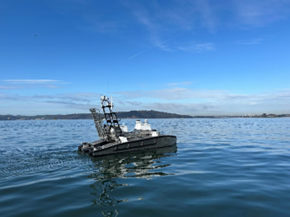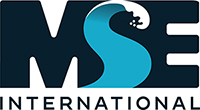MSE partner new BOSS LEVEL project which has won funding to address the challenges of ship-port interfaces of future decarbonised vessel fleets

Image © Hydro-Surv; REAV-60 long endurance USV
MSE International is part of the new BOSS LEVEL project which will investigate the feasibility of an on-board sensor and data acquisition network with AI-based analytics to address the challenges of ship-port interfaces in the era of future decarbonised vessel fleets. The project, which is part of the Smart Shipping Acceleration Fund (SSAF), funded by the UK Department for Transport (DfT) and delivered by Innovate UK, will particularly focus on on-board battery energy storage systems (BESS) which are becoming major cost centres on many low-carbon vessels.
There is a growing realisation that future decarbonised vessel fleets will require a dramatic increase in the level of on-board instrumentation, data assimilation and analytics because optimised vessel efficiency will be essential to meet environmental and economic levels of performance, and this in turn depends on data-driven control systems that can optimise ship operations against multiple goals (carbon and pollutant emissions, fuel use, adherence to schedule, drive train degradation etc).
In addition, low-carbon electric and hybrid drive trains incorporate technologies (notably batteries) whose long-term degradation of state-of-health is not well understood and which require very extensive monitoring to ensure integrity and optimise maintenance. The added dimension of smart shipping trends towards de-crewing (and ultimately autonomy) will also depend on instrumentation to provide situational awareness to a shore station that advises the shipís master and which mitigates risks arising from on-board fault or hazard conditions.
BOSS LEVEL will carry out a reference design case study based on an existing vessel to illustrate a deployed system and to highlight compliance factors. This forms a key element of the subsequent commercialisation planning.† Costs and benefits will be analysed to support the investment case.† This analysis will include wider on-board and shore-based asset and emissions monitoring, as well as imaging for situation awareness, to define the communication bandwidth requirements and the channels to be used.
Alex Barter, Managing Director of B4T and project lead, commented, ďA clean maritime future is contingent on wholesale electrification. BOSSLEVEL provides crucial evidence for operators, designers and policy makers to migrate last nautical mile propulsion to electric, balancing positive commercial and environmental impact.Ē
Industry and academia are coming together as a consortia to deliver BOSS LEVEL including; B4T, specialists in IoT sensors; Swanbarton, experts in large-scale battery storage and mobility; HydroSurv, builders and designers of autonomous vessel power trains; WMG, specialists in battery systems research and development; the University of Portsmouth, power systems engineering department, Houlder, a leading marine and offshore design and engineering consultancy and MSE International, maritime sector specialists in commercialisation planning and dissemination.
This project is part of the Smart Shipping Acceleration Fund (SSAF), funded by the UK Department for Transport (DfT) and delivered by Innovate UK. SSAF is part of the Departmentís UK Shipping Office for Reducing Emissions (UK SHORE) programme, a £206m initiative focused on developing the technology necessary to decarbonise the UK domestic maritime sector. The project will run until March 2025.
To be kept up to date with activities, projects and events in the area of maritime decarbonisation, sign up to the MSE Maritime Decarbonisation Interest Group.



